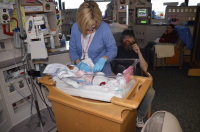 More preterm infants are beginning their lives in the neonatal intensive care units (NICUs) of U.S. hospitals. Thanks to advances in technology and medicine, babies are able to survive even earlier outside the womb, despite the developmental and functional disabilities that often accompany their births. Teams of highly skilled doctors, nurses, dieticians, respiratory therapists, and in increasing numbers, speech language pathologists care for these “small wonders”. These professionals must have strong, current knowledge of normal and abnormal embryology, perinatal and postnatal infant development, as well as familiarity with family-centered and team-based practices. The NICU team not only tends to the needs of its tiny patients, but provides support and education for their families as well, both during and following their stay.
More preterm infants are beginning their lives in the neonatal intensive care units (NICUs) of U.S. hospitals. Thanks to advances in technology and medicine, babies are able to survive even earlier outside the womb, despite the developmental and functional disabilities that often accompany their births. Teams of highly skilled doctors, nurses, dieticians, respiratory therapists, and in increasing numbers, speech language pathologists care for these “small wonders”. These professionals must have strong, current knowledge of normal and abnormal embryology, perinatal and postnatal infant development, as well as familiarity with family-centered and team-based practices. The NICU team not only tends to the needs of its tiny patients, but provides support and education for their families as well, both during and following their stay.
Most modern NICUs are designed with sufficient space and privacy around the isolettes to encourage infant-parent bonding and care-giving. In this type of relaxed and nurturing environment, speech language professionals focus on developmental outcomes relating to communication, cognition, swallowing, and feeding. An infant’s ability to successfully suck, swallow and feed orally are important milestones preceding their discharge. Delayed enteral feeds and prolonged respiratory support increases the risk of feeding difficulties. Low birth weight preemies and medically fragile babies are at higher risk for feeding issues that may take weeks to resolve. The SLP plays a crucial function in evaluating individualized feeding objectives, working with the NICU team to accomplish those, and providing valuable information to families about process and interaction strategies, so that everyone is working towards the same goal.
Coordinating and managing parental and medical expectations regarding feeding interventions is an important responsibility of the NICU speech language pathologist. Most NICU babies will be temporarily tube fed, even if they were full term. As their medical issues resolve, some infants will show signs that they are able to tolerate oral feedings, but some require additional time. Since eating involves swallowing, sucking and breathing, the SLP will set out strategies for improving coordination of those functions based on each baby’s developmental markers at any given stage . Some common strategies may be positional changes, pacing the feedings, allowing for breathing breaks, and using a different bottle nipple. Following successful implementation of all strategies, families and medical providers often push for increased feedings on the assumption that “practice makes perfect.” However, the exact opposite, a slowing of the feeding progress may actually occur. Once again the speech clinician must play a pivotal part in convincing all the parties to follow the baby’s cues. Involvement of the speech language pathologist continues even after the child has been discharged from the hospital. Many NICU graduates need speech therapy throughout their first year of life, and feeding issues can still arise, often at 3-4 months of age. Therapy is especially critical during the progression to solid foods and at the onset of expressive-receptive language. At this juncture, the NICU SLP becomes a resource for follow-up medical providers and for continued family support. As more hospitals employ speech pathologists in the NICU, both the in-house and after-care roles of these professionals is sure to broaden.
If you are a Speech Language Pathologist and seeking to change environments contact Centra at 800 535 0076 and we will find you the right position for your particular skills.